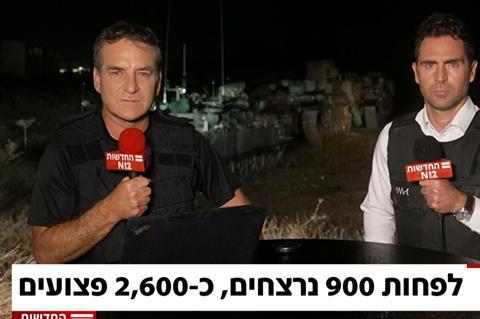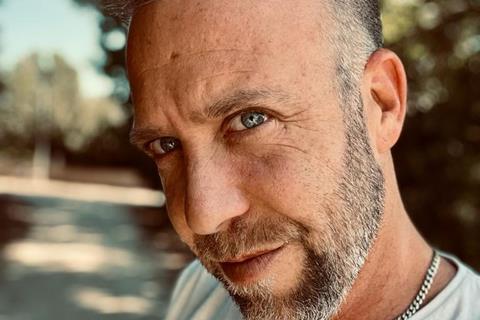
Israel’s film and TV industry has mobilised in the wake of Saturday’s (October 7) Hamas terror attack in the south of the country that has seen cinemas go dark and productions put on hold as the country reels in shock and grapples with the response.
Theatres have remained closed since the weekend and the Israel Defense Forces’ (IDF) Home Front Command has mandated all local Israeli film and TV productions must cease as the entire film and audiovisual industry shifts to on-the-ground aid and live news coverage.
Major networks such as Israel’s largest TV channel, Keshet 12, have put all non-news programming on hold.
Israel officially declared war on the Hamas group on Sunday after the deadliest single day in the country since the Yom Kippur War 50 years ago. The unfolding crisis has resulted in the death of more than 1,000 people and injured upwards of 3,400 in Israel so far, with around 150 held hostage, according to local reports.
The BBC reports more than 800 Palestinians have died in the Palestinian territory of Gaza from Israeli reprisal operations.
“The entire industry is shut down,” Adar Shafran, director producer and chairman of Israeli producers association IPAC, told Screen. “We are still in shock. Nothing will be the same after this war, but for now we’re just concentrating on survival.”
An industry united
Local producers, directors, talent and crews are working together to help soldiers, including reservists, and civilians. “Everyone is coming together. Everyone is helping everyone,” Shafran said. “We have a group of around 2,000 people from the industry and we’re all doing what we can to help.”

In addition to cooking and organising food donations, producers are using their expertise and equipment to get provisions to stricken areas as quickly as possible.
Others are producing videos with the families of those abducted to help locate missing people via mainstream and social media. Most are based in Tel Aviv and have been using both their military training skills and industry resources to reach the southern region where violence is ongoing.
Rotem Shamir, the director of Fauda, Hostages and the upcoming second season of spy thriller No Man’s Land, told Screen, “In the days that passed since the attack, we have ceased all work on our productions. It is not only impossible to think about work in a time like this, but there are people dead or missing everywhere. We now turn our energy and time to help out as much as we can.”
Among the industry leaders spearheading the efforts is producer Dganit Barash, who has been pulling together “all of the people in production in our very big industry from film to TV to events” to work around the clock collecting money, buying food and supplies for the front lines.
Several WhatsApp groups have been formed. “There are 600 industry people in our group alone, among thousands of others,” Barash said, adding: “We’re not doing anything but this. It feels like a horror film, but it’s real. As producers, we are used to this rhythm, to doing things from right now to tomorrow in a minute. Time isn’t a limit, everything is possible from our production standpoint, but this production is the hardest I’ve ever done.”
Yuval Yefet, Israeli writer-creator of Netflix’s Rough Diamonds and hit thriller Line In The Sand, explained, “No-one can continue their lives normally. Some stay home with their young kids since the schools are shut down, many volunteer in support of the affected families and the soldiers, and others have been recruited to the army. Like everyone, I have stopped writing and am focusing on my children and helping others as much as I can.”
Shafran’s debut feature Running On Sand was scheduled to be released in Israel at the end of the month via United King Films. “All the publicity was planned, but now everything is stopped and I have no idea what will happen,” he said.
He is also a producer on Netflix’s first Hebrew-language original series Bros and said that the crew member delivering the series to Netflix on Saturday was killed en route. “He pre-sent an email to us for Saturday at 9pm, and by the time we received it, we knew he was dead.”
Israeli filmmaker Yahav Winner, who had been reported missing after confronting Hamas terrorists on Saturday, was found dead on Tuesday according to a Facebook post from one of his family members.
Shafran told Screen as he left Tel Aviv to drive to the south with resources for those in need, “Nothing will be the same. Everything will change. This is the biggest thing happening in our generation and will stay with us until the day we die.”
Life imitating art
Fauda and Line In The Sand actor Tzachi Halevi has been recruited to join the Israeli defense efforts. His Fauda co-star and the show’s creator Lior Raz, who is also set to star in Ridley Scott’s Gladiator 2, headed to the south of Israel to join volunteers in relief efforts.
Raz, a former soldier in an elite Israeli special forces unit, posted a video to his Instagram page with sounds of loud blasts in the background as he ducked for cover. He said he had left “to join hundreds of brave brothers in arms volunteers” sent to Sderot to extract two families and added, “No fear!”.
Fellow Fauda actor and Israeli singer-songwriter Idan Amedi has also enlisted in the IDF to join the fight on the front lines.
While the situation would appear to be life imitating art, Yefet told Screen, “It’s actually the opposite for them – they used their real-life expertise on set and are now back to using them in real life. It’s war.
“Even writers like us could never have imagined such a scenario,” he added.
Fauda director Shamir said that after he was woken early on Saturday morning to the sound of alarms he rushed his family to a bomb shelter in line with Israeli protocol. When he saw an online video “of Hamas militants shooting their way out of the back of a pickup truck” he said: “I thought it must be fake news or propaganda. It looked like a shot out of Fauda.”
Yefet is working on a show about the Four Mothers organisation, which helped to end the 18-year Lebanon war. “It’s an inspirational story about ending bloodshed, right as bloodshed begins again around us.”
Israeli-born filmmaker Guy Nattiv’s timely release Golda dives into the 1973 Yom Kippur War, which was triggered by a similar surprise attack 50 years and a day before Hamas’ Saturday operation. “The situation of not being ready for the war, 2,700 soldiers killed – it’s not even close to what we are seeing now. Golda is just a preview of what is happening – there are civilians being slaughtered in their homes. It’s barbaric,” Nattiv told Screen.

Nattiv has taken to Instagram to share images and information of missing Israelis and to urge support from the world. “I became the shofar [a Jewish ceremonial horn] of Israelis who need their voice to be out there so I’m using my platform to give them a voice.”
Impact on global events
Since the initial attacks which have closed cinemas, schools and business, travel is limited as several major airlines have cut flights in and out of the country’s main travel hub Tel Aviv International airport.
The Haifa International Film Festival which was meant to continue through Saturday was cut short due to the heightened security situation. Indian actress Nushrratt Bharuccha was initially stranded in Israel following her visit to the festival, but managed to make her way back to India with embassy assistance.
Israeli participants at MIA in Rome and at the BFI London Film Festival are scrambling to return to their home country, while upcoming events including Mipcom will surely be missing key Israeli industry players.
Egypt’s El Gouna Film Festival has been rescheduled from October 13-20 to October 27-November 2.
“I was supposed to go to Mipcom next Saturday but cancelled everything,” Shafran said. “I won’t leave my family and can’t leave Israel right now.”
Fremantle issued a statement today (October 10) announcing it would not bring Australian satirical comedy series C*A*U*G*H*T to Cannes “in light of the current situation unfolding in Israel”. Executive produced by and starring Sean Penn, the series is about soldiers in a war-torn country who are taken hostage and become viral video celebrities. Fremantle added: “At this time, our hearts and thoughts are with our colleagues and our partners in Israel, and all those affected.”
Keshet’s international sales teams will attend Mipcom with representatives from its offices in Los Angeles, London and Paris, but Israeli executives are unlikely to travel to the market.
Since the outbreak of conflict there has been a jump in TV viewing to an average of 600 minutes per day. Market share of the main broadcast channels has doubled from 37% to around 70%. On Saturday evening, more than 2m Israeli citizens were glued to TV sets. Local news media “were the only remaining source of communication and information for hours following the attacks,” Shamir explained.
“They [located and eveacuated] trapped civilians and even evacuated them in their cars as the army was nowhere to be found. They were also the only reliable source of information for a country that had no idea what was going on.”
International actors are continuing to voice their support for Israel on social media including Israeli actress Gal Gadot, Israeli-born Natalie Portman, Jessica Chastain, Jamie Lee Curtis, Naomi Watts, Edgar Ramirez, Erin Moriarty and Josh Gad.
“They have millions of followers and they are supporting us,” Nattiv said, adding that his message for the global film industry was clear. “I want people in the industry to stop thinking about their followers. We’ve seen in real time what happened when people weren’t vocal because they were afraid in 1939. In the age of social media, you can write something, you can say something in support of Israel. Please say something.”

























No comments yet